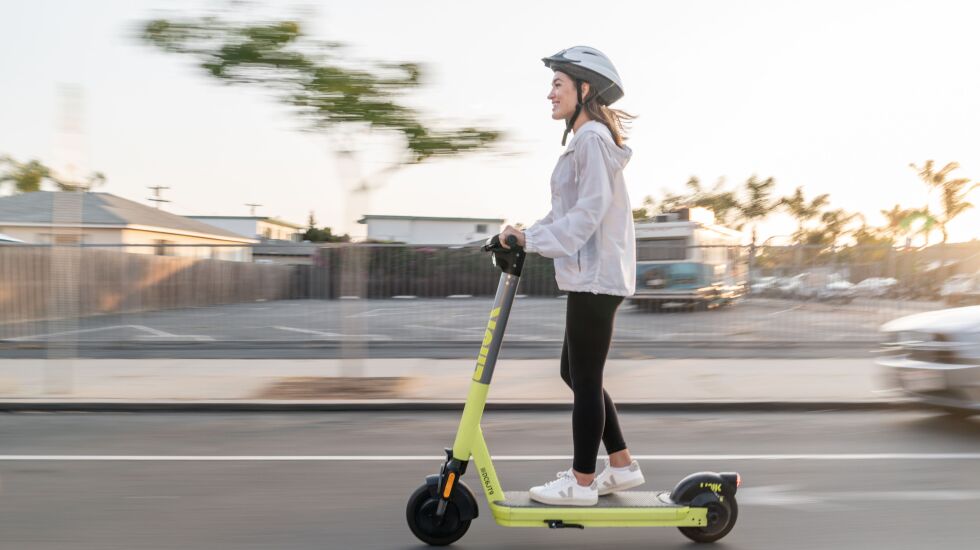
Scooter-rental company Superpedestrian has left the Chicago market, blaming stiff competition and the city’s special relationship with competitor Lyft, which also operates the city’s Divvy short-term bike rental service.
The Cambridge, Massachusetts-based company told the city last week it had pulled out the last of its 1,000 scooters, according to the company and the Chicago Department of Transportation.
Superpedestrian had 12.5% of the city’s rental scooters but only 4% of scooter rides since the company launched the service in Chicago in June 2022, CDOT said.
The company was one of four companies with licenses to offer short-term scooter rentals. The remaining companies are Lyft, Spin and Lime.
Superpedestrian spokesperson Jamie Perkins said the company struggled to compete against Lyft, saying Lyft was given special access to the Central Business District.
“The city’s special relationship with Lyft, the operator of Divvy, makes it a difficult landscape” for other scooter companies, Perkins said.
Superpedestrian was allowed to keep just 40 scooters in the Central Business District, Perkins said. Meanwhile, the company and other rental scooter providers, excluding Lyft, are required to have 50% of their fleets on the South and West sides, where they saw fewer riders. Superpedestrian said about 60% of its scooter trips began in those areas.
CDOT, responding to Superpedestrian’s claim, said in a statement: “One of the top goals of Chicago’s scooter sharing program is to increase access to and ridership of shared micromobility for all Chicagoans, but especially for residents facing elevated economic, health, mobility, and accessibility barriers. That’s why the program requires licensees to deploy at least 50% of their devices in Equity Priority Areas covering many South and West side neighborhoods.”
A Lime spokesperson said the regulations around the Central Business District have an impact on business, especially in preventing longer rides from the South and West Sides to jobs-heavy downtown.
“Lime is proud of the program we’ve built in Chicago with a focus on equity that helps us produce record-setting ridership, but it is definitely true that the program could be even better for our riders and helping meet the city’s transportation and sustainability goals,” LeAaron Foley, Lime’s senior director of government affairs, said in a statement.
A spokesman for Spin said Superpedestrian’s departure was “unfortunate” and reflects how the micromobility industry has changed over the past two years.
“The early days of the industry were heavily growth-focused but today there is a very real mandate for financial sustainability,” Spin spokesman John Lankford said in a statement. “This is positive and reflects a maturing industry; at the same time, regulatory frameworks will need to evolve if the industry is to have a robust future.”
He said the scooter company needs city regulations “that prioritize critical goals like transportation equity and safety, while doing so in financially sustainable ways for private operators.”
Lyft did not reply to a request for comment.
Scooter companies have deployed an average of 57% of their fleets in “equity priority areas” on the South and West sides, CDOT said. About 42% of total scooter trips began in these communities, CDOT said, an increase from 23% from the 2020 scooter pilot program.
Superpedestrian will now focus on its other main markets: Los Angeles, Seattle and Baltimore, Perkins said.
Scooter ridership has increased dramatically since the city’s pilot programs in 2019 and 2020.
About 3.2 million scooter trips have been taken since May 2022, when rental scooter services were fully launched, CDOT said. More than a million trips have been taken this summer, since June 21, CDOT said. That’s a 170% increase from the same period last year.
The remaining companies have about 6,000 scooters. Lime has 3,000; Spin has 1,500; and Lyft has 1,500 scooters, CDOT said. Lyft’s scooters are limited to the greater downtown area.
Also Thursday, Lime said its ridership in Chicago is booming. The San Francisco-based company has recorded more than 1 million rides this year.







